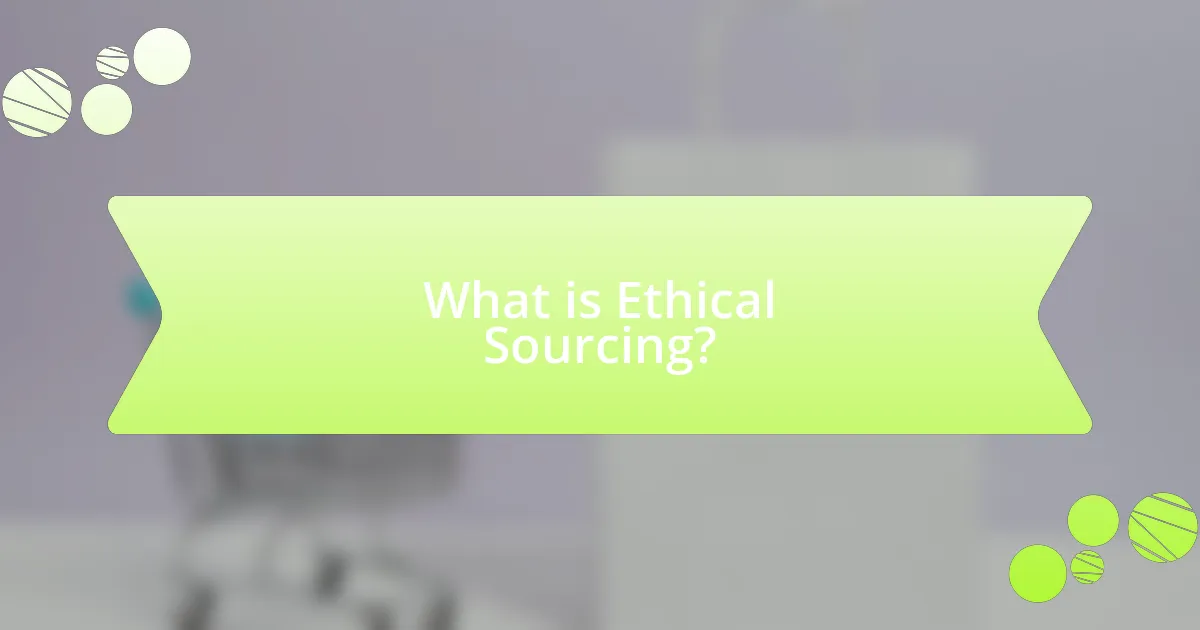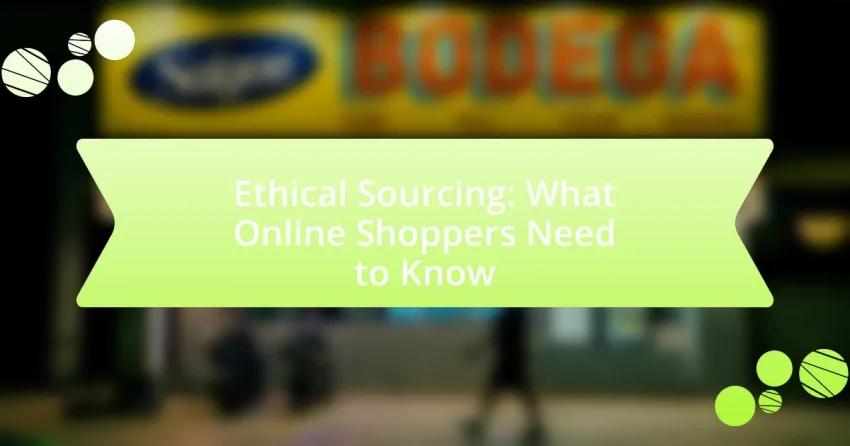Ethical sourcing is the practice of obtaining products and materials in a responsible and sustainable manner, considering social, environmental, and economic impacts. This article outlines the importance of ethical sourcing for online shoppers, emphasizing fair labor practices, environmental stewardship, and transparency in supply chains. It addresses common misconceptions, the challenges faced in ethical sourcing, and how consumers can identify ethically sourced products through certifications. Additionally, the article highlights the benefits of ethical sourcing for both consumers and businesses, including enhanced brand loyalty and customer satisfaction, while providing practical steps for shoppers to support ethical practices in their purchasing decisions.

What is Ethical Sourcing?
Ethical sourcing is the practice of ensuring that the products and materials used in production are obtained in a responsible and sustainable manner. This involves considering the social, environmental, and economic impacts of sourcing decisions, such as fair labor practices, environmental stewardship, and community engagement. For instance, companies that engage in ethical sourcing often adhere to standards set by organizations like Fair Trade, which promotes fair wages and safe working conditions for workers in developing countries.
Why is Ethical Sourcing important for online shoppers?
Ethical sourcing is important for online shoppers because it ensures that products are obtained in a responsible and sustainable manner, promoting fair labor practices and environmental stewardship. This practice helps consumers make informed choices that align with their values, as many shoppers today prioritize purchasing from brands that demonstrate social responsibility. According to a 2021 survey by Nielsen, 73% of global consumers are willing to change their consumption habits to reduce environmental impact, highlighting the growing demand for ethically sourced products. By supporting ethical sourcing, online shoppers contribute to positive social change and encourage companies to adopt more sustainable practices.
What are the key principles of Ethical Sourcing?
The key principles of Ethical Sourcing include fair labor practices, environmental sustainability, and transparency in supply chains. Fair labor practices ensure that workers receive fair wages, safe working conditions, and the right to organize, which is supported by the International Labour Organization’s standards. Environmental sustainability focuses on minimizing ecological impact through responsible sourcing of materials and reducing waste, as highlighted by the United Nations’ Sustainable Development Goals. Transparency in supply chains involves clear communication about sourcing practices and the origins of products, which builds consumer trust and accountability, as evidenced by the growing demand for brands to disclose their supply chain information.
How does Ethical Sourcing impact consumer choices?
Ethical sourcing significantly influences consumer choices by driving preferences towards brands that demonstrate social responsibility and sustainability. Research indicates that 66% of global consumers are willing to pay more for sustainable brands, reflecting a growing demand for ethically sourced products. This trend is further supported by the 2021 Global Sustainability Study by Nielsen, which found that 81% of millennials expect companies to be environmentally responsible. As a result, businesses that prioritize ethical sourcing can enhance their market appeal and customer loyalty, ultimately impacting purchasing decisions.
What are the common misconceptions about Ethical Sourcing?
Common misconceptions about ethical sourcing include the belief that it is only about fair labor practices, that all ethical products are significantly more expensive, and that certification guarantees complete ethical compliance. Ethical sourcing encompasses a broader range of issues, including environmental sustainability and animal welfare, not just labor conditions. While some ethical products may carry a higher price tag due to better practices, many affordable options exist that meet ethical standards. Additionally, certifications can vary in rigor and transparency, meaning that not all certified products are equally ethical. For instance, a study by the Ethical Trading Initiative highlights that certification does not always equate to comprehensive ethical practices, as companies may still exploit loopholes.
How do these misconceptions affect shopping behavior?
Misconceptions about ethical sourcing significantly influence shopping behavior by leading consumers to make uninformed purchasing decisions. For instance, shoppers may believe that all products labeled as “eco-friendly” or “sustainable” are genuinely ethical, which can result in the support of brands that do not adhere to true ethical practices. Research indicates that 66% of consumers are willing to pay more for sustainable brands, yet many do not verify the authenticity of these claims, often falling prey to greenwashing tactics. This lack of critical evaluation can skew market demand towards misleading brands, ultimately undermining genuine ethical sourcing efforts.
What are the real challenges in Ethical Sourcing?
The real challenges in ethical sourcing include ensuring transparency in supply chains, verifying compliance with labor standards, and addressing environmental sustainability. Transparency is often hindered by complex supply chains that obscure the origins of materials and labor practices. For instance, a 2021 report by the Ethical Trading Initiative highlighted that 60% of companies struggle to trace their supply chains effectively. Verifying compliance with labor standards is complicated by varying regulations across countries, leading to potential exploitation of workers. Additionally, environmental sustainability poses challenges as companies must balance ethical sourcing with cost-effectiveness, often resulting in compromises. According to a 2020 survey by McKinsey, 66% of consumers expressed a willingness to pay more for sustainable products, yet many companies still prioritize lower costs over ethical practices.

How can online shoppers identify ethically sourced products?
Online shoppers can identify ethically sourced products by looking for certifications from recognized organizations, such as Fair Trade, Rainforest Alliance, or B Corp. These certifications indicate that the products meet specific ethical standards regarding labor practices, environmental impact, and sustainability. For example, Fair Trade certification ensures that producers receive fair wages and work in safe conditions, while B Corp certification assesses a company’s overall social and environmental performance. Additionally, shoppers can research brands’ transparency regarding their supply chains and sourcing practices, as companies committed to ethical sourcing often provide detailed information about their sourcing methods and labor conditions on their websites.
What certifications should shoppers look for?
Shoppers should look for certifications such as Fair Trade, USDA Organic, and Global Organic Textile Standard (GOTS). Fair Trade certification ensures that products are made under fair labor conditions and that producers receive fair compensation. USDA Organic certification guarantees that agricultural products are grown without synthetic pesticides or fertilizers, promoting environmental sustainability. GOTS certification indicates that textiles are made from organic fibers and adhere to strict environmental and social criteria throughout the production process. These certifications provide assurance of ethical sourcing practices and help consumers make informed purchasing decisions.
How do these certifications ensure ethical practices?
Certifications ensure ethical practices by establishing standardized criteria that organizations must meet to demonstrate compliance with ethical sourcing principles. These criteria often include fair labor practices, environmental sustainability, and transparency in supply chains. For example, certifications like Fair Trade and Global Organic Textile Standard require regular audits and assessments to verify adherence to their ethical guidelines, thereby holding companies accountable for their sourcing practices. This structured approach not only promotes ethical behavior among businesses but also provides consumers with assurance that the products they purchase align with their values regarding social and environmental responsibility.
What are some reputable organizations that provide these certifications?
Reputable organizations that provide certifications in ethical sourcing include the Fair Trade Federation, which certifies businesses that meet rigorous social and environmental standards, and the Rainforest Alliance, known for its certification of sustainable agriculture and forestry practices. Additionally, the Global Organic Textile Standard (GOTS) certifies organic textiles, ensuring environmentally and socially responsible manufacturing processes. These organizations are recognized globally for their commitment to ethical sourcing and sustainability, providing consumers with assurance regarding the products they purchase.
How can product labeling help in identifying ethical sourcing?
Product labeling can help in identifying ethical sourcing by providing transparent information about the origins and production practices of a product. Labels often include certifications from recognized organizations, such as Fair Trade or USDA Organic, which indicate adherence to specific ethical standards. For instance, a product labeled as Fair Trade guarantees that producers receive fair compensation and work under safe conditions, thus ensuring ethical sourcing practices. Additionally, labels may disclose supply chain details, allowing consumers to trace the product’s journey from raw materials to finished goods, further validating the ethical claims made by the brand.
What information should be included on product labels?
Product labels should include essential information such as the product name, ingredients, nutritional facts, allergens, weight or volume, manufacturer details, and expiration date. This information ensures consumers can make informed choices, particularly regarding dietary restrictions and ethical considerations. For instance, the inclusion of allergen information is mandated by regulations in many countries, such as the Food Allergen Labeling and Consumer Protection Act in the United States, which requires clear labeling to protect consumers with food allergies.
How can shoppers verify the claims made on labels?
Shoppers can verify the claims made on labels by researching the brand’s sourcing practices and certifications. They should look for third-party certifications such as Fair Trade, USDA Organic, or Rainforest Alliance, which indicate adherence to specific ethical standards. Additionally, shoppers can visit the brand’s website for transparency reports or product information that details sourcing and production processes. According to a 2021 survey by the International Trade Centre, 66% of consumers are willing to pay more for sustainable brands, highlighting the importance of verified claims in purchasing decisions.

What are the benefits of Ethical Sourcing for consumers and businesses?
Ethical sourcing provides significant benefits for both consumers and businesses by promoting transparency, sustainability, and social responsibility. For consumers, ethical sourcing ensures that products are made under fair labor conditions, which aligns with their values and enhances their purchasing decisions. A study by Nielsen found that 66% of global consumers are willing to pay more for sustainable brands, indicating a strong market preference for ethically sourced products.
For businesses, ethical sourcing can lead to improved brand loyalty and reputation, as consumers increasingly favor companies that demonstrate corporate social responsibility. According to a report by the Harvard Business Review, companies that prioritize ethical sourcing can experience a 20% increase in customer loyalty. Additionally, ethical sourcing can mitigate risks associated with supply chain disruptions and enhance operational efficiency by fostering long-term relationships with suppliers committed to sustainable practices.
How does Ethical Sourcing enhance brand loyalty?
Ethical sourcing enhances brand loyalty by fostering trust and emotional connection between consumers and brands. When companies prioritize ethical sourcing, they demonstrate a commitment to social responsibility, which resonates with consumers who value sustainability and ethical practices. Research indicates that 66% of consumers are willing to pay more for products from brands committed to positive social and environmental impact, reinforcing loyalty. Additionally, brands that transparently communicate their ethical sourcing practices can differentiate themselves in a crowded market, leading to increased customer retention and advocacy.
What role does transparency play in building trust?
Transparency is crucial in building trust as it fosters open communication and accountability between parties. When companies disclose information about their sourcing practices, production processes, and supply chain conditions, consumers feel more confident in the integrity of the brand. Research indicates that 94% of consumers are likely to be loyal to a brand that offers complete transparency, highlighting its importance in consumer trust. Furthermore, transparency reduces the likelihood of misinformation and enhances the perceived reliability of a brand, ultimately leading to stronger customer relationships and increased loyalty.
How can Ethical Sourcing improve customer satisfaction?
Ethical sourcing can improve customer satisfaction by fostering trust and loyalty among consumers. When companies prioritize ethical sourcing, they demonstrate a commitment to social responsibility, which resonates with consumers who value sustainability and fair labor practices. Research indicates that 66% of global consumers are willing to pay more for sustainable brands, highlighting the direct correlation between ethical practices and customer preference. Additionally, ethical sourcing can enhance brand reputation, leading to increased customer retention and positive word-of-mouth, further solidifying customer satisfaction.
What are the environmental impacts of Ethical Sourcing?
Ethical sourcing significantly reduces negative environmental impacts by promoting sustainable practices in the supply chain. This approach often involves sourcing materials from suppliers who adhere to environmentally friendly methods, such as using renewable resources, minimizing waste, and reducing carbon emissions. For instance, a study by the World Wildlife Fund indicates that sustainable sourcing can lead to a 30% reduction in greenhouse gas emissions compared to conventional sourcing methods. Additionally, ethical sourcing encourages biodiversity conservation by supporting suppliers who engage in responsible land use and habitat protection. This holistic approach not only mitigates environmental degradation but also fosters a more sustainable economy.
How does Ethical Sourcing contribute to sustainability?
Ethical sourcing contributes to sustainability by ensuring that products are obtained in a responsible manner that respects both the environment and human rights. This approach minimizes environmental degradation by promoting practices such as fair labor conditions, reduced carbon footprints, and sustainable resource management. For instance, according to the World Economic Forum, companies that adopt ethical sourcing practices can reduce their environmental impact by up to 30% through responsible supply chain management. Additionally, ethical sourcing fosters economic sustainability by supporting local communities and encouraging fair trade, which can lead to long-term economic benefits and stability.
What practices can reduce the carbon footprint in sourcing?
Practices that can reduce the carbon footprint in sourcing include prioritizing local suppliers, utilizing sustainable materials, and implementing efficient logistics. Local sourcing minimizes transportation emissions, as products travel shorter distances. Sustainable materials, such as recycled or organic options, have lower environmental impacts during production. Efficient logistics, including optimized shipping routes and consolidated shipments, further decrease carbon emissions associated with transportation. According to a study by the Carbon Trust, local sourcing can reduce carbon emissions by up to 30% compared to sourcing from distant suppliers.
What practical steps can online shoppers take to support Ethical Sourcing?
Online shoppers can support ethical sourcing by researching brands and choosing those that prioritize fair labor practices and sustainable materials. This involves checking for certifications such as Fair Trade, GOTS (Global Organic Textile Standard), or B Corp status, which indicate a commitment to ethical standards. Additionally, shoppers should read product reviews and company policies to ensure transparency in sourcing practices. Supporting local businesses and artisans can also contribute to ethical sourcing by reducing carbon footprints and promoting fair wages. Engaging in discussions about ethical sourcing on social media platforms can raise awareness and encourage more brands to adopt responsible practices.
How can consumers make informed purchasing decisions?
Consumers can make informed purchasing decisions by researching product origins, understanding ethical sourcing practices, and evaluating brand transparency. Researching product origins allows consumers to identify whether items are sourced sustainably and ethically, which is crucial in today’s market where ethical considerations are increasingly important. Understanding ethical sourcing practices, such as fair labor conditions and environmental impact, helps consumers align their purchases with their values. Evaluating brand transparency involves examining how openly companies communicate their sourcing practices, which can be assessed through certifications, third-party audits, and consumer reviews. According to a 2021 survey by Nielsen, 73% of global consumers are willing to change their consumption habits to reduce environmental impact, highlighting the importance of informed decision-making in purchasing.
What are some tips for finding ethical brands online?
To find ethical brands online, start by researching companies that prioritize sustainability, fair labor practices, and transparency in their supply chains. Look for certifications such as Fair Trade, B Corp, or Global Organic Textile Standard, which indicate adherence to ethical standards. Additionally, read customer reviews and third-party assessments to gauge the brand’s reputation regarding ethical practices. Websites like Good On You provide ratings for fashion brands based on their ethical performance, helping consumers make informed choices.
